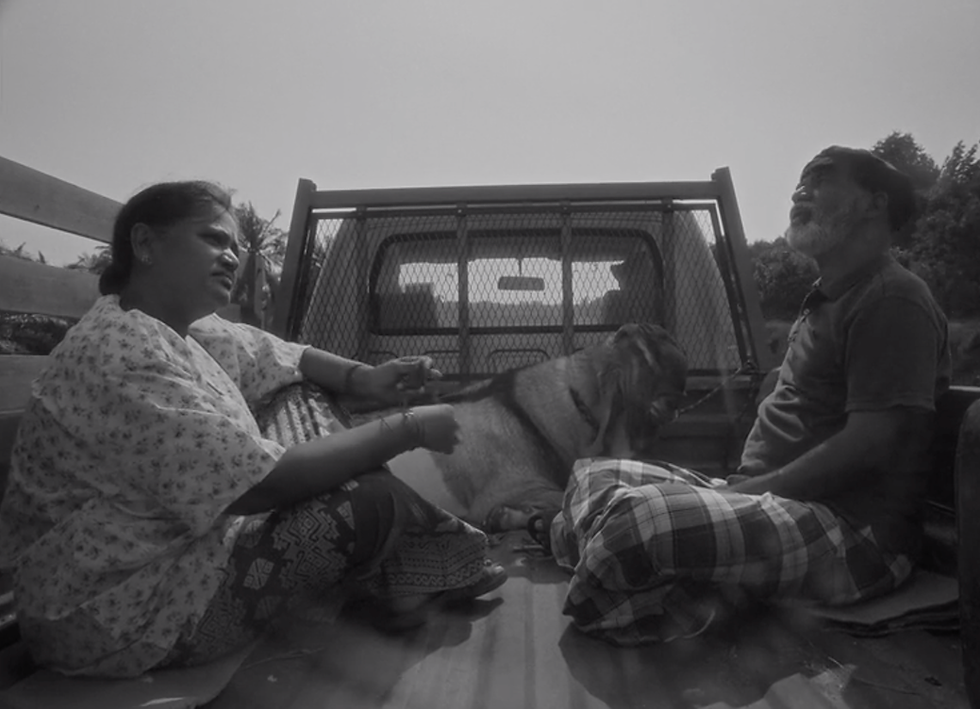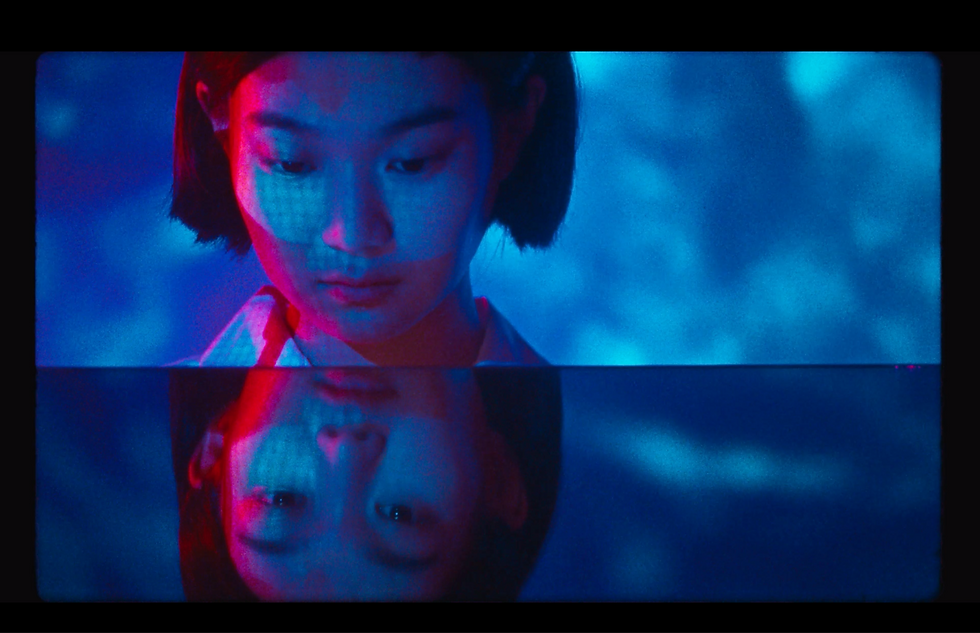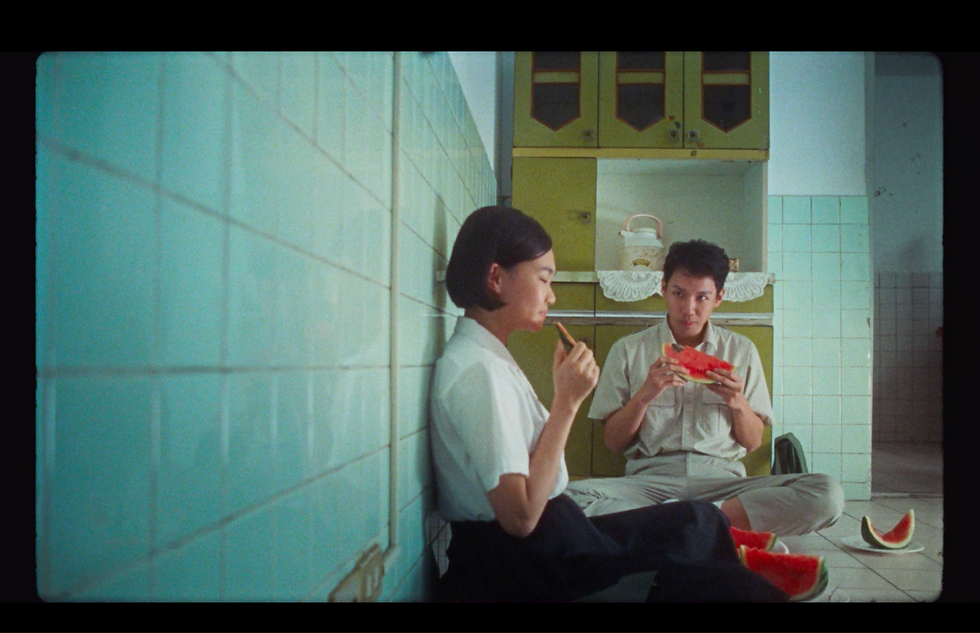MIFF International Shorts 2025: Rejecting Environment, Embracing Nature
- Jessica Chloe Djendria
- Sep 8, 2025
- 7 min read
The International Shorts at this year’s Melbourne International Film Festival (MIFF) are laden with themes of nature and environment, but not in the way you might think.
Showcasing a range of genres and cultures, these 15 films are just a glimpse of the 250 featured at MIFF this year, each creating a profound impact. MIFF 2025’s International Shorts were presented in two parts, each running for approximately 100-120 minutes.
Although many shorts in this year’s collection centre around literal themes of nature, animals, and the environment, these visual elements act as vehicles while delivering a more important message; a message that challenges the status quo, rejects societal expectations, and embraces transformation.
In Panadrilo, directed by Marcela Heilbron, a man is consumed by a crocodile. Rather than succumbing to his fate, the man chooses to accept this new form; “I have become one with the crocodile”, he says as his wife urges him to come back.

A fast-paced short filled with chaos and a tinge of unusualness, Panadrilo tells the story of embracing transformation. With immigration officers on her tail, the man’s wife embarks on her own journey of transformation; as she escapes to a rough-looking reptile conservation centre, she allows herself to be engulfed by a crocodile, and later, into a handbag, all to reach her daughter who lives across the border. Although Panadrilo might seem like a ridiculous analogy for the challenges faced by migrants, it speaks true to an ongoing issue: as of 2025, 123 million people remain displaced due to challenges in their countries or homes, according to the UNHCR.
Following the trend of embracing transformation is Bleat!, directed by Ananth Subramaniam, where a male goat raised to be a sacrifice unexpectedly falls pregnant. Filmed in black and white, the short is a comedy that lightly delivers important messages surrounding queer identity.

This Tamil short is incredibly poignant in Tamil-speaking regions like Sri Lanka, where discrimination against LGBTQ+ communities persists. In Bleat!, an elderly couple attempts to navigate the discovery that their goat grew up to be the opposite of everything it was expected to be: a sacrifice and a heterosexual male. Bleat! utilises its supporting characters to show how societal expectations should not be the box that limits embracing transformation.
Dean of RMIT’s School of Media and Communication, Lisa French, says that in cinema and media, “there’s always been a battleground for representation. It’s always been a struggle”.
Although LGBTQ+ communities in countries like Sri Lanka may still experience persecution,
films like Bleat! join the fight for representation, offering a platform for discussion and acknowledgement. In 2023, a private member’s bill was put forward to repeal colonial-era laws in Sri Lanka that criminalise homosexuality.
Short films have offered more opportunities to “address different identities and taboo subjects”, says Adrian Danks, Associate Professor of Cinema Studies and Media at RMIT.

Another prime example from South Asia is Ali, directed by Adnan Al Rajeev. Awarded a Short Film Special Distinction at the 2025 Cannes Film Festival, Ali paints a world where women are forbidden to sing. The titular character, Ali, decides to fight back. Ali's voice was surgically altered to sound male, when in reality, he possesses a female voice that is revealed at the end. Ali tells the story of gender expression in a society that represses it, with Ali representing a defiance of societal expectations.

This Bengali short addresses topics that resonate with the sentiments of Bengali communities towards gender identity. In 2014, West Bengal was among the first states in India to set up the Transgender Welfare Development Board, which aims to increase the transgender community's participation in policy creation.
The level at which short films can address certain issues ultimately depends on the country and culture, as “some countries are more draconian in their attempts to stifle diversity and different forms of expression”, says Danks.
However, Danks remains hopeful. “In more experimental, less economically-driven cinema, it’s more possible to address certain issues.”

A Brighter Summer Day for the Lady Avengers, directed by Birdy Wei-Ting Hung, takes on a more experimental route, visualising bubbling sexual desires through bold colours, neon lights, and dreamy hallucinations. The film is bold in illustrating this sexual desire through the perspective of the female instead of the male. French noted that there is a dissonance between how women’s sexual identity has been portrayed to how it is actually being experienced by women due to “a long history of masculine views of female sexuality”.

In a society that limits women’s voices, A Brighter Summer Day for the Lady Avengers is a colourful piece of validation for the gender expression of Asian women and women everywhere. Its ending reveals a sad irony: while women are forced to repress their sexual identities, these same women are portrayed as sexual objects to be ogled at.
It is incredibly important that women’s issues are addressed by female directors, as it allows them to portray “female subjectivity”, says French, “which is creating a visibility of female perspectives”.
Another notable issue raised was the ‘double burden’ women have to undertake when choosing between having a career and having a family. Nervous Energy, directed by Eve Liu, illustrates this dilemma through the debate of two best friends who aspire to be filmmakers. Initially, best friends Kiki and Jay are determined to end their respective romantic relationships to pursue their dreams. While Jay finds it easy to break things off, Kiki hesitates in the face of societal expectations and a longing to start a family. Eventually, Kiki and Jay go their separate ways, with Kiki ultimately choosing her relationship and Jay becoming a successful filmmaker.

Winning this year’s MIFF Shorts Award for Best Fiction Short Film, Nervous Energy is a reality for many women in East Asia; out of the 148 countries analysed in the World Economic Forum’s Global Gender Gap Report 2025, countries like South Korea, China, and Japan rank 101st, 103rd, and 118th, respectively. Nervous Energy shines a light on the tensions that exist between embracing your true nature and rejecting social norms. The film poses an important question: Is it worth it to chase one thing when it forces you to sacrifice another?
French says that the dilemma shown through Nervous Energy is not an uncommon one: “filmmakers often have to choose between family and work because of the freelance nature of it”.
“If they choose a family, they have to leave the industry, and the stories go with them.”

A short that best illustrates embracing nature would be Vox Humana, directed by Don Josephus Raphael Eblahan, which talks about the natural state vs the forced state. A series of natural disasters leads to an investigation, and a mysterious, ape-like man is suspected to be the root cause. The man is arrested and subjected to human punishments despite being deemed an animal. It is then revealed that he has been a human all along.

The climax of this short is a monologue carried out by Bruce Venida, who plays the mysterious man. He talks about how humans have shifted into a ‘forced state’; adorning themselves with clothes, building unnaturally tall buildings, and now trying to eradicate all that is natural. On the surface, the movie’s themes speak to society’s relationship with the climate.
Humans continue to destroy and take advantage of the environment. The Global Carbon Budget reported that a record-high of 37.4 billion tonnes of CO2 were emitted in 2024. However, reading between the lines, Vox Humana also speaks about the treatment of Indigenous people and how colonies have tried to erase their histories. Recently, the United Nations Environment Programme announced the development of Core Human Rights Principles that included the voice of Indigenous peoples in the conservation of the environment.
Described by French as “little works of poetry”, short films have the power to express the inexpressible and to put out ideas into spaces where they might have never been discussed.
As Danks says, “you don’t make short films as a commercial choice. Often, you’re making a short film to express something”.
Nevertheless, bringing these ideas to life always comes at a cost. Screen Australia recently reinstated direct funding for short films through its Short Film Fund, offering up to $125,000 towards production budget.
This extra boost in support is incredibly important to increasing the representation of minorities and their issues on screen, as “screen and media is where people get their information about life and the world," says French.
This year’s International Shorts selection at MIFF managed to give a platform to societal and environmental issues, all through a medium that is easily consumed.
Although Danks admitted that the level of impact short films make might not be large, having it change the perspectives of just five people would make it worthwhile.
Short films as a form of media will continue to be influential on culture and society. French calls for continued efforts for representation within the screen and media.
“We have to see all facets and all works of life and all genders and all sexualities and experiences. Otherwise, the dominant status quo rises to the top.”








Very interesting and informative👍